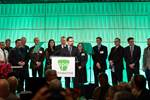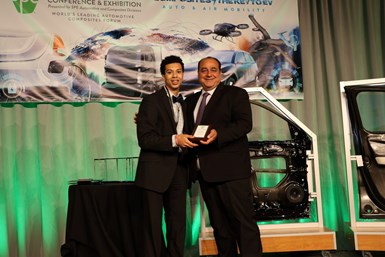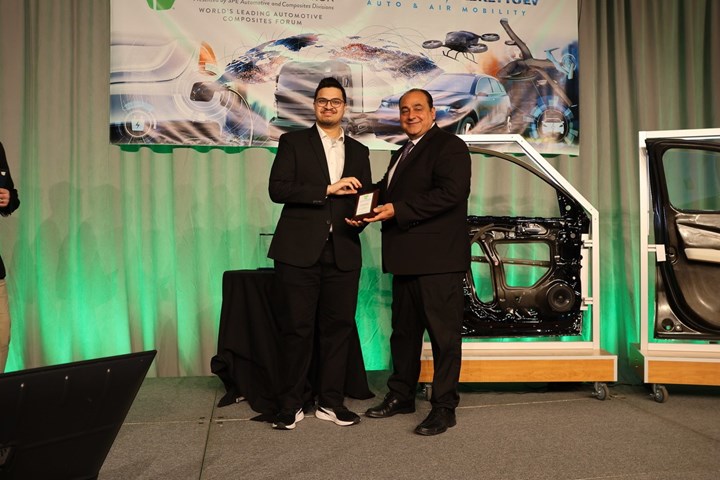SPE ACCE welcomes students to submit poster competition abstracts
The ACCE provides students with a chance to present their work in composites to industry experts. Posters are due July 1, 2024.
First place winners, Amit M. Deshpande and Johnathan Behr from the 2023 ACCE poster session competition. Source | SPE ACCE
The SPE Automotive Composites Conference & Expo (ACCE) invites graduate, undergraduate, community college and high school students to submit abstracts on innovative composites technologies for automotive and ground transportation, to present at the event’s annual student poster competition. Sponsored by Dassault Systèmes (Waltham, Mass., U.S.) competition will be held during ACCE, Sept. 4-6, 2024 in Novi, Michigan.
Judges — industry experts, SPE board members and members of the media — will review all posters with student authors during the conference. Students entering the poster competition will also give a 5-minute mini-talk podium presentation on their poster topic in a special technical session. First-, second- and third-pace awards will be presented to winners in graduate, undergraduate and high school categories during a ceremony during the ACCE.
Poster titles and abstracts are due by July 1, 2024. Digital copies of posters are due by Aug. 20, 2024 for pre-review by judges. Abstracts and digital copies of the posters need to be submitted online via the “submit 2024 papers, presentations and posters” button here. Questions should be sent to Douglas_E_Smith@baylor.edu.
Students will need to bring 24 × 36-inch printed copies of their posters to the conference (find the poster template here). Large multi-poster panels and push pins for displaying the posters in the Student Poster Display area will be provided. All students presenting a poster in the competition will receive free registration to the conference, and a shared hotel room provided by SPE ACCE. Students who submit abstracts and posters early will be provided with accommodations at the Hyatt Place hotel on-site at ACCE.
Poster topics may include, but are not limited to, subjects such as:
- Automotive composites
- Composites and lightweight materials for trucks
- Biocomposites
- Nanocomposites
- Glass, carbon and hybrid fibers
- Thermoset and thermoplastic technologies
- Recycling and green technologies
- Multi-materials
- Joining technologies
- Applications of composites in electric vehicles
- Modeling and analysis of lightweight materials
- CAFE standards and mandates
- Cost-effective manufacturing
- Use of advanced materials in innovative applications
- Virtual prototyping and design
- Microstructure, failure and fracture
- Failure envelopes and theories
- Additive manufacturing of composites
- Air mobility
Students and their posters are ranked using the following criteria:
- Content (student and poster demonstrate clarity of topic, objectives and background);
- Motivation for research and technical relevance to conference theme;
- Methodology and approach to problem;
- Quality of proposed research results/findings;
- Conclusions are supported by information presented;
- Presentation (display aesthetics are pleasing and there is a logical flow between sections);
- Knowledgeable (presenter has a good grasp of the subject);
- Understandability (poster is effective even without student being present to explain it); and
- Overall rank versus other posters and presenters.
Related Content
-
Thermoplastic composites: Cracking the horizontal body panel nut
Versatile sandwich panel technology solves decades-long exterior automotive challenge.
-
Co-molding SMC with braided glass fiber demonstrates truck bed potential
Prepreg co-molding compound by IDI Composites International and A&P Technology enables new geometries and levels of strength and resiliency for automotive, mobility.
-
Cryo-compressed hydrogen, the best solution for storage and refueling stations?
Cryomotive’s CRYOGAS solution claims the highest storage density, lowest refueling cost and widest operating range without H2 losses while using one-fifth the carbon fiber required in compressed gas tanks.















